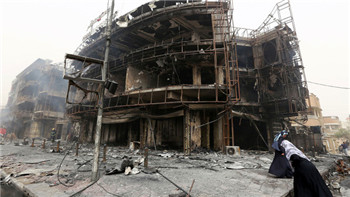
News that the US is sending 560 more troops to Iraq as part of the push to recapture the northern city of Mosul from Isis is being seen as further evidence the jihadis are on the run. Surveys that show Isis has lost 12 per cent of its self-declared caliphate in Syria and Iraq so far this year, after a shrinkage of 14 per cent in 2015, feed into this narrative. So, too, in its grim way, does the spate of terror attacks with which Isis has marked Ramadan, from Baghdad to Bangladesh, and Medina to Istanbul.
据称,美国将向伊拉克增派560名军人,力图从“伊斯兰国”(ISIS)手中夺回伊拉克北部城市摩苏尔。该消息被视为圣战分子正在溃败的进一步证据。与ISIS溃败说相吻合的是,有调查称,今年迄今,ISIS在叙利亚和伊拉克自封的哈里发国已经丢掉了12%的地盘(2015年丢掉了14%)。同样与ISIS溃败说相吻合的是,它以其残忍的方式接连在世界各地——从巴格达到孟加拉国,从麦地那到伊斯坦布尔——发动恐怖袭击,以庆祝斋月(Ramadan)。
Some interpret this proliferation of atrocity – the attacks at a Shia market in Baghdad that killed almost 300 and at Istanbul’s Ataturk international airport, where 45 died, were especially savage – as an index of jihadi failure as Isis territory contracts.
有人将这种暴行的扩大(尤为凶残的是,巴格达一处什叶派市场发生的袭击导致近300人死亡;伊斯坦布尔的阿塔图尔克国际机场发生的袭击导致45人死亡)解读为,伴随ISIS所占地盘的收缩,圣战分子溃败前在疯狂反扑。
This seems overly reductive. Isis has always launched far-flung attacks and switched between, as well as combined, regular and irregular warfare. If they held more territory, and their momentum had not been arrested, there might actually be more such attacks.
这样想似乎过于简单化。ISIS一直都在很广的范围内发动袭击,在常规与非常战之间切换自如,或是将两者相结合。如果他们占据更多地盘,其势头未得到遏制的话,实际上,此类袭击有可能更多。
The scale of this Sunni caliphate’s ambition should have become clear from the Isis assault on Paris last November — it aims to intensify the war at home and abroad, advancing and retreating according to need. The attacks on Paris, Brussels, Istanbul and elsewhere are diversions. But they are also provocations intended to lure more western “crusaders” and Shia “idolaters” into the killing fields of Syria and Iraq.
从ISIS去年11月对巴黎的袭击中,应该能看清这个逊尼派哈里发国的野心。该组织的目标是加剧国内外的战事,并根据需要选择进攻或撤退。对巴黎、布鲁塞尔、伊斯坦布尔及其他地区的袭击只是“副业”。他们还试图通过这些袭击进行挑衅,以期吸引更多的西方“十字军”及什叶派“偶像崇拜者”来到叙利亚和伊拉克的杀戮场。
Isis’s core calculation is threefold: that however much territory they lose, they will still be swimming in a sea of alienated Sunni inside the shell states they infest such as Iraq and Syria; that Iran and its Arab allies — such as Lebanon’s Hizbollah, Bashar-al-Assad’s Syria or the Shia-dominated government in Baghdad — will continue to supply them with an alibi for their jihad; and that neighbouring states such as Turkey and Saudi Arabia, Sunni powers also ranged against Iran’s Shia Arab axis, are vulnerable to their reach and their message.
ISIS的核心盘算有三层:第一,无论失去多少地盘,他们仍可以寄居在伊拉克、叙利亚等“空壳”国家中,这些国家中有大量被疏远的逊尼派,为他们提供了自由的生存空间;第二,伊朗及其阿拉伯盟友——如黎巴嫩真主党(Hizbollah)、巴沙尔•阿萨德(Bashar-al-Assad)的叙利亚或者什叶派主导的伊拉克政府——将继续为他们进行圣战提供理由;第三,他们也很容易把自己的影响力和宣传扩大到土耳其、沙特等同样反对伊朗的什叶派阿拉伯轴心的逊尼派邻国。
For five years Turkey had allowed Islamist rebels to use its territory as a launchpad to attack the Assad regime in Syria, during which Isis implanted lethal cells. Yet Turkey’s overwhelming priority has been to stop its Kurdish minority from linking up with Syrian Kurds, who are consolidating self-governing territory just across the border, akin to Kurdish home rule in northern Iraq. Until now, Recep Tayyip Erdogan, Turkey’s neo-Islamist president, has treated Isis as a secondary issue, painting it as part of a western-inspired conspiracy to do him and his country down.
五年来,土耳其一直允许伊斯兰主义叛军使用其领土作为基地,攻击叙利亚的阿萨德政权。在此期间,ISIS扎下了致命的根基。但土耳其重中之重的首要任务,一直是要阻止本国的库尔德人少数派与叙利亚的库尔德人联合起来,后者正在土叙边境巩固自己的自治区域(其自治类似于伊拉克北部库尔德人实现的自治)。直至现在,土耳其信奉新伊斯兰主义的总统雷杰普•塔伊普•埃尔多安(Recep Tayyip Erdogan)一直未将ISIS作为头等大事对待,他还将ISIS描绘成西方主导的阴谋的一部分,目的是让他下台,让土耳其衰落。
Saudi Arabia, meanwhile, is overwhelmingly concerned to halt what it sees as Iran’s predatory advance through Arab lands, and finds itself in uncomfortable competition with Isis as to which of them is a more credible scourge of the Shia.
与此同时,沙特更关心的是要阻止它眼中在阿拉伯人土地上横行的伊朗,并且它发现自己陷入了一场尴尬的竞争,即与ISIS相比,谁是打击什叶派更可靠的人选。
More important than calculations of whether territorial shrinkage prompts terrorist offensives, therefore, is to search for ways of immunising a susceptible Sunni minority against jihadi contagion. The US-led invasion of Iraq in 2003 replaced a Sunni minority regime with a Shia-dominated one. While calling for the downfall of the Assad regime from 2011, the west declined to back Sunni majority rebels in Syria. From what it painted as a betrayal, Isis fashioned the fanciful idea that Sunni worldwide — about 1.3bn of 1.6bn Muslims — are a victimised minority it alone can defend.
因此,比起思考是不是地盘缩小激起了恐怖袭击,更重要的是要想方设法让伊拉克和叙利亚两国境内的逊尼少数派免受圣战思想的侵袭。美国2003年领导的入侵伊拉克的战争终结了逊尼少数派的统治,取而代之的是什叶派主导的政权;虽然西方自2011年起就呼吁阿萨德政权下台,但拒绝支持叙利亚的逊尼少数派叛军。ISIS将这描绘成一种背叛,由此制造出这一荒谬的概念:即全世界逊尼派穆斯林(在16亿穆斯林中有13亿都是逊尼派)是受迫害的少数群体,而ISIS可以独自保护这一群体。
How to counter this? So long as the Assads remain in place in Syria, supported by Russia and Iran, striking civilian targets with impunity and unmolested by the US-led coalition fighting Isis in Iraq and Syria, the task looks impossible. American reliance on Syrian and Iraqi Kurdish fighters on the ground, and the US-backed Iraqi government’s dependence on Iranian-trained Shia militias, greatly help Isis to posture as the shield of the Sunni Arabs.
如何反击ISIS制造的这一概念?只要阿萨德家族在俄罗斯及伊朗的支持下仍然在叙利亚掌权,打击平民目标而不受惩罚,而且美国领导的在伊拉克和叙利亚打击ISIS的联军对此也不加干预,那么,反击这一概念的任务看起来就不可能完成。美国对于地面上叙利亚和伊拉克库尔德武装分子的依赖、以及美国支持的伊拉克政府对伊朗培训的什叶派民兵的依赖,对ISIS展示其作为逊尼派阿拉伯人守护者的形象极为有利。
It is hard to see any of this changing without real collaboration between the US and Russia, with each reining back their local allies, Saudi Arabia and Turkey on the one hand and Iran on the other, and pushing them towards regional detente. Governance solutions must be explored simultaneously with this. Confederalism, offering secure local power to all communities under the umbrella of a loose national compact sharing some power and resources, looks the only way forward.
如果没有美国与俄罗斯之间的真正协作,各自控制住自己的地区盟友(一边是沙特阿拉伯和土耳其,另一边是伊朗)并推动它们走向区域和解,当前的局势将很难出现任何变化。与此同时,必须探索治理方面的解决方案。邦联制——在一个分享部分权力与资源的松散全国性契约下向所有社群提供有保障的地方权力——看来是唯一出路。
Few but the region’s stateless Kurds have given much thought to this. As things stand, therefore, talk of federalism is at best dismissed as a zero-sum game, and more usually as a foreign plot to break up unitary states. But Syria and Iraq are already broken.
该地区没有独立国家的库尔德人大多没有认真考虑过这个方案。因此,在目前的情况下,谈论联邦制度充其量不过被斥为一场零和游戏,在更多时候则会被看作旨在分裂单一制国家的外国阴谋。但叙利亚、伊拉克本已四分五裂。
Until discussions on their future draw in the Sunni and the Shia, as well as other groups such as Syria’s Alawites, there are going to be more broken states and no way to put them back together again.
在逊尼派与什叶派(以及像叙利亚的阿拉维派等群体)参与到关于自身未来的谈判中来之前,更多国家会陷入分裂,无法重归统一。











